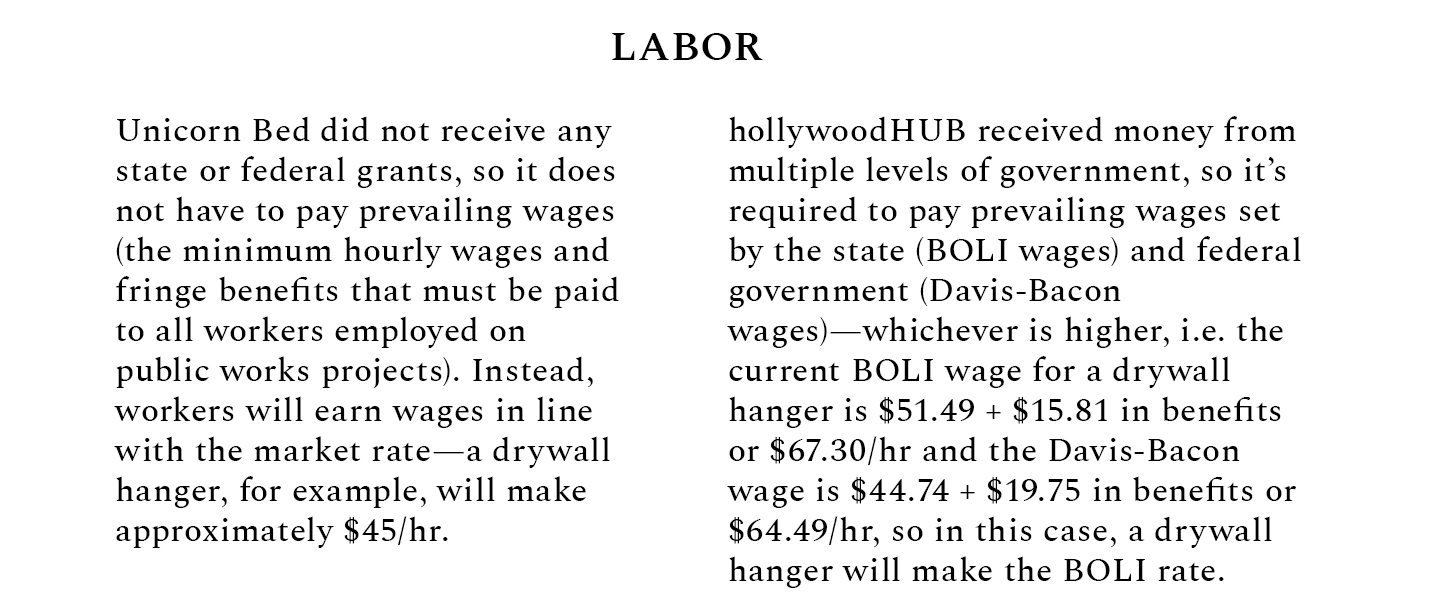Not long ago, the Portland Housing Bureau posted the good news that financing on the biggest affordable housing project it had ever funded had finally closed, meaning construction could finally begin! The tone of the tweet was celebratory and even included a party hat emoji, so it was somewhat jarring to read the replies:
“You should be down right ashamed of yourself.”
“Huge grift”
“Government can’t do anything right.”
“Almost $700,000 PER UNIT”
The commenters had likely clicked the link at the end of the thread for the project’s main page and divided the total development cost listed there ($155,186,602) by the number of units in the building (224) to arrive at $692,797 or “Almost $700,000 PER UNIT.”
It isn’t exactly this simple, and $692,797 isn’t exactly accurate, because the total development cost includes more than just individual units: there is also a teen lounge, two-story playroom, courtyard, paseo, and private meeting space for one-on-one counseling and financial education. In addition, the total development cost is closer to $136.7 million, the cost at the time of financial closing last fall. (The extra $18 million includes administrative fees for the Portland Housing Bond and developer fees, both of which are source and use.) Unfortunately, PHB wasn’t able to give an exact number for the cost per unit (a studio, one-, two-, or three-bedroom), so if we want to know how much it costs the city, when it works with a developer, to build one unit of affordable housing (and we do!), we are left to do the same imperfect math the commenters did, just with a different numerator. This time, we get approximately $610,000 per unit.
Compare that to $370,000, which is approximately what it costs developer Kevin Cavenaugh, of Guerrilla Development, to build one unit of affordable housing. The comparison is imperfect as all comparisons between apartment buildings are, because no two are exactly alike, but there are also many relevant similarities between Cavenaugh’s project, Unicorn Bed, and the city’s project, hollywoodHUB. (BRIDGE Housing is the developer for hollywoodHUB.) Both buildings will have two-bedroom apartments. (In Unicorn Bed’s case, all of them will be two-bedrooms; in hollywoodHUB’s case, 94 will be two-bedrooms.) The apartments in both buildings will be affordable by the same standard in that they’ll be for households who earn no more than 60% of the area median income, and will rent for 30% of that income. (hollywoodHUB will also have 71 units for households who earn no more than 30% AMI.) Both buildings are meant to house families (Unicorn Bed is specifically for single mothers), and thus, include amenities for children: hollywoodHUB has a playroom and Unicorn Bed has a room for a daycare. They will both be situated in walkable, high-transit, “high-opportunity” areas. Yet one costs almost half the price of the other to build. Why?

Specifically, the big differences that cause the really big difference in cost have to do with labor, community engagement, financing, and scale.





For Cavenaugh’s part, he refrained from criticizing the city and said many times he takes risks the city never would—not all of which work out—and that the need for affordable housing in Portland is so great and so vast, that any kind of affordable housing here is a good thing. “It’s a state of emergency,” he said. “If someone came up to me right now with an idea for an affordable housing project, before they even finished their sentence, I would say: approved.”
I wonder if Portland voters/taxpayers agree—what is worth the higher price to taxpayers here and where would they (you!) prefer to cut costs, if anywhere?
Thank you for reading and for sharing your thoughts!
All illustrations by the amazingly talented Deepti Menon.


I love Kevin's projects! I think we need smaller low-income housing projects like his in every Portland neighborhood. Smaller low-income housing projects are less controversial (as you explain with the person from the NA saying it is the right size) than bigger ones, but they are also usually more livable for the people who reside there. I also think mixed-income places are important. Research has shown that formerly homeless folks tend to do better long-term if they're surrounded by the positive social networks/role models that mixed housing supplies.
GOD. this is fascinating. thanks for the info, once again, Devin!